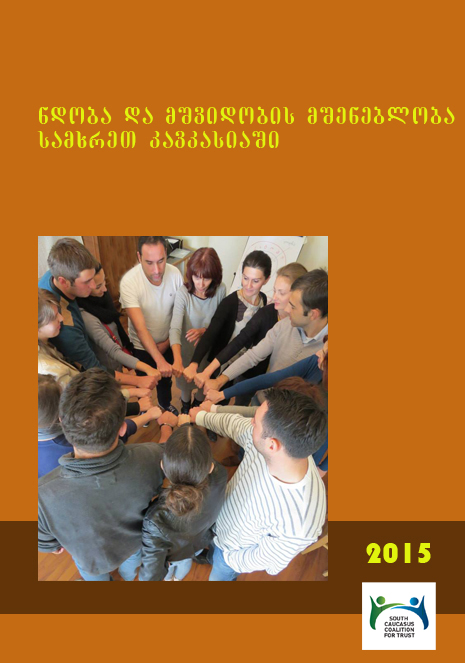Nino Tarkhnishvili, Radio Liberty
On November 5, book Trust and Peace Building in the South Caucasus was presented in the National Library of Georgia. The book was published by Human Rights Center and the Coalition for Trust in three languages – Georgian, Russian and English. The publishers said the purpose of the book is to find resources for dialogue and cooperation and to contribute to starting a new phase in the history of the South Caucasus: the rebuilding of trust. The articles in the book were written by Georgian, Azerbaijan and Armenian authors as well as by representatives of non-recognized entities of the region.
Nino Tlashadze is from a mixed family. Her mother is ethnic Ossetian. Nino’s cousins, close relatives live in the occupied territory of the South Ossetia and have not met each other for years. Nino is a deputy executive director at Human Rights Center and one of main directions of her work is looking for the resources to promote dialogue and trust-building between Georgian and Ossetian peoples. Nino is holding the book published by Human Rights Center and the Norwegian Helsinki Committee which is dedicated to the peace and trust building in the South Caucasus.
“Role of mixed families is mediation between conflicting societies. Publishing similar books and publications is very important first of all to destroy stereotypes and beliefs that only Georgian side was victimized in the armed conflicts. Georgian readers should learn that victims and pains were huge on both sides of our conflicts.”
The book Trust and Peace Building in the South Caucasus contains articles of the journalists, human rights defenders and historians from Georgia, Azerbaijan, Armenia, Abkhazia, South Ossetia and Nagorno Karabakh. The book is unique in its collection of different opinions of authors from the South Caucasus countries and other regions. At the same time, the authors have a common goal – to restore trust between the peoples in the region and to promote reconciliation and peacebuilding. “Nagorno Karabakh Today,” “Violations of the Right to Freedom of Movement for Citizens of Abkhazia,” “Youth in Peacebuilding,” it is short list of the publications in the book. Aleko Tskitishvili, executive director of Human Rights Center, singled out one chapter from the book where articles have anonymous authors; they are Azerbaijani authors – for example article Rethinking Nagorno-Karabakh Conflict: Dynamics, Perceptions and Prospects for Transformation.
“We clarified in the footnotes why we have anonymous authors in the book. These are authors from Azerbaijan who might face problems in their country for publishing their articles in this book together with Armenian colleagues. So, situation is quite complicated in this country. I can say that Georgian people have much better communication with Abkhaz and Ossetian people than Azerbaijani and Armenian people with each other.”
Public Defender of Georgia Ucha Nanuashvili wrote about the importance and necessity of the dialogue and trust-building with Abkhaz people in his article published in the book. He was initiator of the Campaign “Sorry” or “Hatamzait” in Abkhaz language, which was commenced in 2007 and aimed to change communication and relation manner between Georgian and Abkhaz peoples. Ucha Nanuashvili wrote that it was apolitical, anti-war movement. Today as Public Defender of Georgia, Ucha Nanuashvili still believes that peaceful dialogue has no alternative. He wrote about it in his publication “Why I apology to Abkhaz people?”
“In our mentalities this war between Georgians and Abkhazians, Ossetians and Georgians- still continues. Unfortunately it still on our minds. We should first defeat this war in our minds and then speak about trust building and conflict resolution. There are a lot of problems. And their number is increasing but I would say that our authority does not adequately respond to this problem; there are very few initiatives on confidence building.”
Doctor of Philology Naira Bepieva spoke about lack of initiatives for the trust building and dialogue between Georgian, Abkhaz and Ossetian peoples. She spoke about the trust-building policy between Georgian and Ossetian peoples and said the process is very slow. She said it is important to publish similar books but it is very little.
“We need to work in different directions – cultural-educational, economic or other directions and NGOs and governmental institutions should cooperate; separate initiatives will not have tangible outcome.”
The publishers of the book said the readers will feel that the articles are written in respect of human rights. They will not encounter hate speech or stereotypes about enemies in the articles. Reading the book everybody will get convinced that the only purpose of the book is to fight for peace.
News
December 13, 2023
Ethnic minorities outside the peace dialogue
November 6, 2023
‘Peace’ agenda of political parties
Popular
Articles
February 13, 2024




